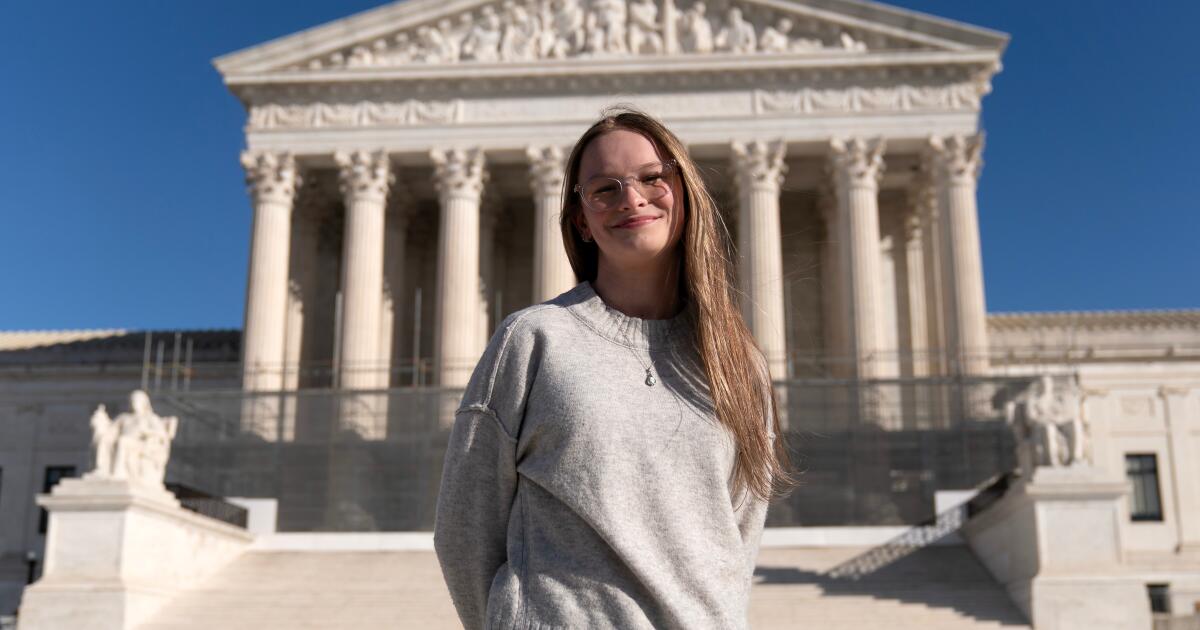Supreme Court likely to uphold state bans on trans athletes competing on girls’ sports teams
WASHINGTON — The Supreme Court justices sounded ready on Tuesday to uphold state laws that forbid transgender athletes from competing on school sports teams for girls.
Idaho, West Virginia and 25 other Republican-led states say a student’s biological sex at birth should determine who can play on the girls’ or boys’ teams.
They say it is unfair to girls to permit biological males to compete against them in sports like track and field or swimming. “Biological males are, on average, bigger, stronger and faster than biological females,” West Virginia’s state lawyers said.
While the court’s conservative majority court is likely to rule for these states, the justices said they prefer a narrow decision limited to these laws.
If so, such a ruling for the red states will not directly change the law in California and the more than a dozen other Democratic-led states that forbid discrimination based on gender identity. Those laws protect rights of transgender girls to compete on a girls’ team.
A similar dispute came before the court last year.
Then, the conservative justices ruled Tennessee and other red states may prohibit gender-affirming drugs and medical treatments for teenagers who suffer from gender dysphoria.
The 6-3 majority said this was not unconstitutional discrimination based on the teenagers’ transgender status. But that ruling did not strike down the conflicting law in California.
In recent months, the Trump administration joined the transgender sports cases on the side of West Virginia and Idaho.
But its lawyers argued only that the Constitution permits states to exclude transgender girls from girls’ teams. It does not require that they do so, their lawyers said.
Even a West Virginia lawyer agreed. “There is enough room for California to make a different interpretation,” state solicitor Michael R. Williams told the court.
Deputy Solicitor Gen. Hashim Mooppan said these Democratic states “are violating Title IX,” the education law that allows separate sports teams for girls and boys. But he said the court should not rule on that question now.
Last year, in response to the court’s ruling on gender-affirming care, President Trump cut off federal funds to hospitals and medical facilities that provided such care.
A ruling upholding restrictions on transgender athletes could spur the Trump administration to threaten Democratic states with a loss of federal education funds.
Becky Pepper-Jackson, now 15, has carried on a lonely legal fight to compete on her school’s track team in Bridgeport, W.Va.
Designated male at birth, she says she is the only transgender girl competing in her state and has been the target of complaints and protests.
In middle school, Becky participated in cross-country as a sixth-grader and described herself as slow. She “routinely placed near the back of the pack,” her attorneys told the court.
But upon reaching high school, she has been winning.
In 2024, she “placed in the top three in every track event in which B.P.J. competed, winning most,” the state’s attorneys said. Last spring “focusing on strength events, B.P.J. bumped female competitors out of the state tournament, then placed third in the state in discus and eighth in shot put while competing against much older female athletes,” they told the court.
Her attorney, Joshua Block of the American Civil Liberties Union, said she has been winning in the shot put and discus “through hard work and practice.”
He said she “received puberty-delaying medication and gender-affirming estrogen that allowed her to undergo a hormonal puberty typical of a girl.”
He urged the court to rule for Becky because she does not have a physical advantage due to her biology.
But the justices did not sound inclined to rule on the issue of puberty blockers.
